
At the launch of the National WWII Museum Taube Family Holocaust Education Program, from left to right: Sean Taube, son of Taube Philanthropies founder-director Tad Taube; Stephen Watson, Executive Director, National WWII Museum; Shana Penn, Executive Director, Taube Philanthropies.
The recent development of the Taube Family Holocaust Education Program was established through a generous $2 million pledge from Taube Philanthropies. The initiative strives to share the important story of the Holocaust and its ties to American history, including the US Army’s liberation of Nazi concentration camps, the Jewish American families who lost loved ones at the hands of Nazi Germany, and the survivors who relocated and rebuilt their lives in America. The gift supports free public programming presented annually on International Holocaust Remembrance Day, as well as distance-learning programs that will help students across the country explore individual and collective responsibility in the Holocaust.
The initiative was launched alongside Museum screenings of "Who Will Write Our History," a feature-length documentary examining how Polish Jewish historian Emanuel Ringelblum rallied a secret group within the Warsaw Ghetto to chronicle the lives of thousands of Polish Jews as they starved, suffered, and ultimately were deported to death camps. Ringelblum and his team buried their documents in milk canisters and metal containers, with the hope they’d be found after the war and to ensure their voices and culture would live on. The documentary is based on the book of the same title by Samuel Kassow, with Roberta Grossman as Producer/Director and Nancy Spielberg as Executive Producer.
Founded by businessman and philanthropist Tad Taube in 1981, and now led by both him and his wife Dianne Taube, Taube Philanthropies has strived to support diverse educational, research, cultural, community, and youth organizations in the San Francisco Bay Area, Poland, and Israel. Tad Taube’s story with the Museum began in 2006 when he was introduced to the institution by close friend Pete Wilson, former Governor of California and current Museum Trustee. Taube’s passion for preserving and teaching history strongly connected with the Museum’s mission, and ultimately led to his recent establishment of the Taube Family Holocaust Education Program at the institution.
Taube’s personal family history ties closely to his educational endeavors at the Museum. Born in
Kraków, Poland, he escaped the country just months before the Nazi invasion of 1939, and lost a
significant number of family members in the Holocaust. Taube hopes his contributions make a lasting impression: “The Museum is a national treasure, and I encourage others to sustain its efforts through a legacy gift that will have a lasting purpose for future generations,” Taube said.
